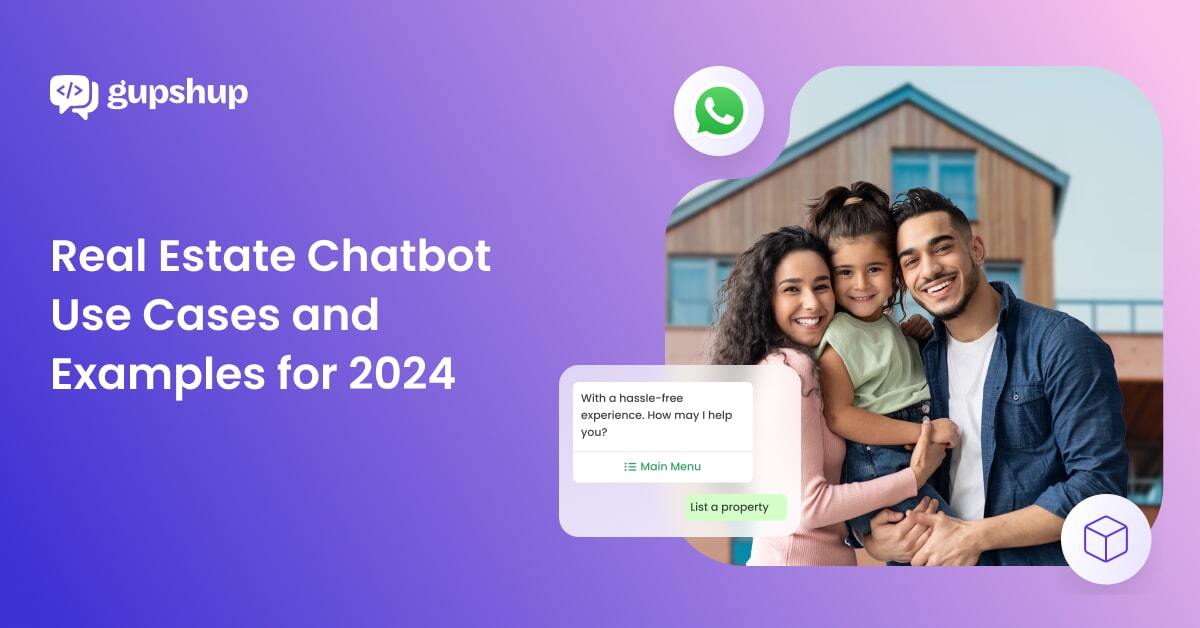Real Estate Chatbot Use Cases and Examples for 2024

The real estate market moves really fast. Buyers expect instant answers, and sellers want results – yesterday. So, how do you keep pace with these demands? Real estate chatbots might just be your solution.
Clients don’t wait around for business hours anymore. They want to view listings, ask about property details, and schedule tours on their own time—whether that’s 9 AM or 9 PM. And sellers? They’re looking for quick updates on interest, feedback on showings, and a way to filter out serious buyers from casual browsers. WhatsApp chatbots for real estate can handle all of that and more.
And the potential here is massive. The AI market in real estate has been on a steady rise, with projections showing growth from $226.7 billion in 2024 to an impressive $731.59 billion by 2029, driven by a compound annual growth rate (CAGR) of 34%. This surge reflects the demand for tools that make real estate transactions more efficient and personalized.
As AI continues to advance, the customer experience in real estate is becoming more responsive and efficient. This has set new standards for how property transactions are handled. In this article, you will learn how to incorporate a WhatsApp bot for real estate into your systems to reduce your workload and be more efficient. 
What is a Real Estate Chatbot?

Before we dive into how WhatsApp chatbots for real estate have changed the face of real estate customer service, it is important to understand what these chatbots are and why they are so important.
A real estate chatbot is a virtual assistant that helps streamline conversations between clients and real estate agents.
Whether it’s answering inquiries, giving virtual property tours, or scheduling appointments, a WhatsApp chatbot can offer support 24/7. They can even guide clients through some of the legal and financial steps of the process. When integrated with a real estate platform, a WhatsApp bot for real estate can provide real-time property information, making the entire experience smoother for both agents and clients.
How do real estate chatbots work?
Using AI and NLP, real estate chatbots can understand user input and deliver instant, personalized responses. They help answer questions, recommend listings, and streamline interactions. Real estate brands can use various digital strategies to build awareness and engage potential clients.
For example, a well-placed Instagram ad featuring a property can direct interested buyers straight to a WhatsApp chat, offering a more interactive and direct way to connect compared to a traditional website.
From there, a WhatsApp bot API can take over, offering tools like mortgage calculators, property galleries, and seamless appointment booking. These chatbots get smarter with every interaction, learning to handle more complex queries, support multiple languages, and better anticipate what clients are looking for.
Why are these chatbots important in real estate today?
Most buyers (97%) begin their property search online and expect quick responses, something a WhatsApp business chatbot is perfect for.
Since chatbots can work around the clock, they’re able to handle inquiries even outside normal business hours. This reduces the workload on agents, letting them focus on more important tasks.
Advantages of Implementing Chatbots in Real Estate

These WhatsApp bots for real estate come with significant advantages that will make the selling-buying process easier for customers and agents –
- Improved lead generation: WhatsApp chatbots engage visitors, collect data, and qualify leads automatically, enabling agents to focus on high-potential prospects.
- Insight collection: They gather data on client preferences, offering valuable insights for targeted marketing strategies.
- 24/7 availability: They provide instant responses and support around the clock, ensuring no missed opportunities during off-hours.
- Enhanced user experience: They offer personalized property recommendations based on user preferences.
- Automation of routine tasks: Scheduling, FAQs, and follow-ups are handled efficiently, freeing up agents for more complex tasks.
- Streamlined property searches: WhatsApp bot for real estate simplifies property searches with filters and real-time listings, making the process faster and more convenient.
- Multilingual support: They break language barriers, catering to a global audience with multilingual interactions.
- Automated follow-ups: Chatbots manage timely follow-ups, maximizing conversion rates and reducing the risk of missed leads.
Diverse Applications of WhatsApp Bot in Real Estate

Here is a list of the diverse applications of WhatsApp business chatbots in real estate –
1. Lead generation and qualification
Chatbots engage website visitors, collect information like budget and location preferences, and qualify leads based on predefined criteria. This helps agents focus on serious prospects.
2. Property listings and searches
WhatsApp business chatbots help clients search for properties based on specific filters like location, price, and amenities, providing real-time listings.
3. Appointment scheduling
Clients can schedule viewings directly with a chatbot, which checks available time slots and confirms appointments.

4. Mortgage calculators
These WhatsApp bots for real estate can assist with mortgage-related queries, offering basic calculations to help users estimate loan amounts or monthly payments.
5. Virtual property tours
Chatbots offer links to virtual tours, enabling clients to explore properties remotely.
6. Customer support & FAQs
Chatbots handle common inquiries such as property availability, pricing, and local amenities.

7. Follow-ups and lead nurturing
WhatsApp chatbots automate follow-up messages, keeping potential clients engaged with updates on new listings or inquiries.
8. Document submission and verification
Clients can upload necessary documents, such as IDs or contracts, directly through the chatbot for fast processing.
9. Rent collection reminders
Chatbots send automatic reminders to tenants for rent payments, making the rental process smoother.

10. Personalized property recommendations
WhatsApp business chatbots analyze client preferences and provide tailored property suggestions.
11. Buyer and seller matching
Chatbots match buyers with sellers based on property preferences and listings, creating better deals for both parties.
12. Open house promotion
Chatbots help promote open houses by sending invitations and managing RSVPs.

13. Rental management assistance
Chatbots assist landlords and tenants with maintenance requests, lease queries, and rent reminders.
14. Client onboarding
Chatbots guide new clients through the onboarding process, explaining the steps required to start buying, renting, or selling properties.
15. Market updates and trends delivery
Chatbots provide real-time market insights and updates to clients based on their areas of interest.

Best Practices for Optimizing Your Real Estate Chatbot

With the practices mentioned below, real estate businesses can optimize their chatbots to improve client interactions, streamline processes, and maximize lead conversion, all while enhancing operational efficiency.
1. Offering multi-channel Support (Websites, Social Media, Apps)
Why limit the chatbot to just one platform when you can have it everywhere? A good WhatsApp business chatbot works across websites, social media, and mobile apps, making it easy for users to connect no matter where they are.
Whether someone’s scrolling through listings on their phone or checking your site on a laptop, the bot will be ready to respond on all channels and continue the conversation from one to another. Offering this multi-channel support increases engagement and gives users a seamless experience across devices.
2. Ensuring chatbot integration with CRM and Property Management Systems
A WhatsApp bot API is a smart tool for handling real estate data. To make the most of it, the bot should integrate smoothly with your CRM, property databases, and MLS. This allows the chatbot to fetch real-time property details, track leads, and store client information—all in one place.
The result? Faster, more accurate responses that streamline everything for agents and clients.
3. Using data insights to improve chatbot interactions continuously
Every conversation the WhatsApp chatbot has is packed with useful data. By analyzing this information, real estate businesses can spot patterns in client preferences, market trends, and frequently asked questions. This helps fine-tune the bot’s responses, making it even better at offering relevant recommendations.
4. Regular updates and training for AI to handle complex queries
To keep things up-to-date, your WhatsApp business chatbot needs regular updates and training to tackle more complex questions. Whether it’s a detailed inquiry about mortgage options or help with legal paperwork, the bot should be equipped to handle it. Continuous learning ensures that it stays useful and relevant, offering real value.
Why Gupshup is the Perfect Solution for Your Real Estate Chatbot?
Gupshup is a leading conversational AI platform that helps real estate businesses enhance client interactions through multi-channel support, including WhatsApp, SMS, and social media. It allows real-time, personalized communication by integrating seamlessly with systems like CRMs, providing fast and accurate responses.
A standout case study is Housing.com, which implemented Gupshup’s WhatsApp bot API to streamline customer engagement. This resulted in an 11x improvement in lead engagement and 40% faster response times, driving higher conversions. By automating property updates and lead follow-ups, Housing.com significantly boosted its efficiency while reducing manual work.
Conclusion: AI and Automation – Future of Real Estate
AI-powered chatbots like Gupshup pave the way for more efficient and personalized experiences. Chatbots are enhancing operational efficiency and transforming how real estate businesses engage with customers by automating critical aspects of client interactions. Success stories like that of Housing.com highlight the potential of these tools to boost engagement and accelerate responses significantly.
The future of real estate lies in harnessing AI to offer seamless, scalable solutions that empower businesses to stay ahead in a competitive market.
FAQ
1. What is the use case of real estate in chatbot?
Real estate chatbots automate tasks such as lead generation, property recommendations, scheduling viewings, and answering FAQs. They provide 24/7 support, personalize interactions, and streamline communication between clients and agents, enhancing both efficiency and client satisfaction.
2. What is a use case of AI in real estate?
AI in real estate is used for predictive analytics, property valuation, and personalized property recommendations. It helps analyze market trends, automate repetitive tasks, and offer tailored recommendations based on user preferences, improving decision-making for buyers and agents.
3. What is a common use case of chatbots?
A common use case for chatbots is customer service, where they assist in answering FAQs, resolving basic queries, and guiding users through processes like booking appointments. Moreover, chatbots are available 24/7, improving response times and reducing the workload of support teams by handling routine interactions.




